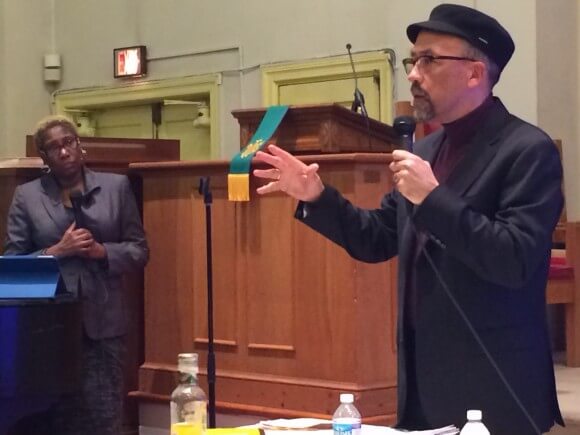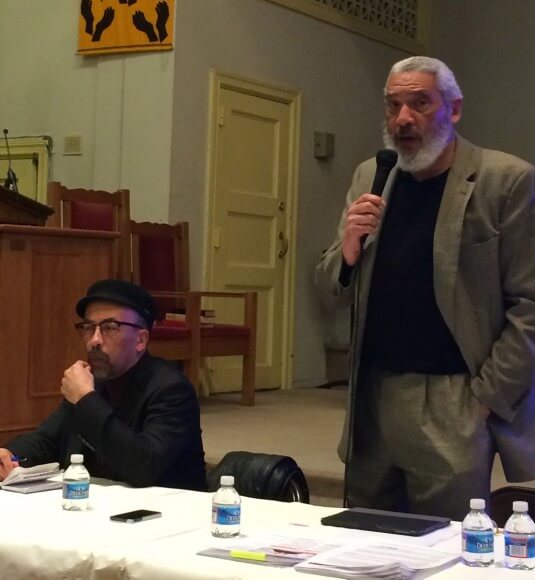
Last week two members of a delegation of African American journalists and artists who traveled to Israel and the occupied Palestinian territories in January spoke of their experiences at a public forum held at the historic Plymouth Congregational United Church of Christ (PCUCC) in Northeast Washington, D.C. The speakers were PCUCC Senior Minister Rev. Graylan Scott Hagler, and Bill Fletcher, Jr., labor activist, Senior Scholar with the Institute for Policy Studies and past president of TransAfrica Forum. Fletcher was leader of the January delegation. The public forum was moderated by Rev. Carolyn L. Boyd, Minister of Organizational and Ministry Development of PCUCC.
Rev. Boyd invited Rev. Hagler to speak first. Hagler recounted an encounter he had in the occupied city of Hebron on the West Bank with the Israeli Defense Forces (IDF) that triggered unpleasant memories from his adolescence in Baltimore:
It was clear to me as a black person just what I was seeing around me, like this police state, this militarized zone, that they were there to enforce really the kind of dehumanization that was going on. So in this particular incident we were walking down the road towards one of the Jewish settlements, and so these two young IDF soldiers come running at us, asking to see our papers… It’s sort of all the stuff that happened to me growing up in Baltimore where cops stopped you all the time to make that demand, that just bristled up in me, and even though I had my hand on my passport in my pocket, I just found that I could not produce it for them. And so as they got a little more frantic about seeing the papers, seeing the papers, and I wasn’t aggressive, I was just standing there non-responsive, and then I asked the question “What for?” One of the soldiers who was from Chicago originally, and I emphasize from Chicago originally, says to me “Because Arabs are not allowed on this road”. And with that I wasn’t going to show my passport, and I didn’t have any interest in walking down that road… But it was one of those times where your experiences as a teenager sort of come back at you very quick, I don’t know whether you call that post-traumatic stress or whatever you call that, but the reality is I just could not, for the life of me, produce some papers on demand for some kids pointing some assault weapons at me.
In her first question for Bill Fletcher, Jr., Rev. Boyd asked about the significance of the trip to him as a black American. In his response, Fletcher compared conditions in the West Bank to Gaza (where the delegation did not go) and also drew parallels with the history of the United States before the Civil War:
You’re in prison. That’s actually all you need to know. The description of Gaza-we did not go to Gaza- but a very popular description of Gaza is as the largest open- air prison on the planet. Actually I don’t think that is true anymore. I think that the West Bank, which is actually larger, is nothing short of an open-air prison. But I want to link it with our own history. In the 1850’s there was the Dred Scott decision that said that black people had no rights that whites were bound to respect. The Israelis have taken the Dred Scott decision and essentially made it a national mandate- that Palestinians have no rights that the Israeli authorities are bound to respect- and this is something that you are confronted with at every moment that you’re there.
Rev. Boyd challenged Fletcher to explain the designation of Israel as an Apartheid state. Fletcher first explained that the designation of the crime of Apartheid refers to a particular form of racial oppression, and that Apartheid in South Africa was but one example:
I think it is important that when we talk about Apartheid and the designation, that we understand that when the United Nations made that designation, created Apartheid as a crime against humanity, they cited South Africa as an example of Apartheid. They did not say that South Africa was the only form of Apartheid. This is really important for us to understand, because Apartheid itself was constructed to a great extent looking at Jim Crow segregation in the United States. What the United Nations understood is that there’s a phenomena, a particular form of racial oppression that exists- I would argue that it also exists in Northern Ireland- that a very particular form of racial oppression exists, and one manifestation was in South Africa. Another related manifestation was in then Rhodesia, in the U.S. South in Jim Crow segregation, and then we see it in Israel…
Fletcher went on to argue that, based on the delegation’s observations in Israel and the occupied Palestinian territories, he would apply the Apartheid label more broadly than former President Jimmy Carter did. Referring to Apartheid, Fletcher said:
[I]t’s not simply in the Occupied Territories, even though in Jimmy Carter’s book, “Palestine: Peace Not Apartheid”, which I think overall was a very important book, and one of the most important things about the book is its title. Carter talks about Apartheid as a system in the occupied territories, but it’s clear when you are traveling within Israel and the occupied territories, that you see the manifestations of the Dred Scott decision. You see the manifestations in terms of the ability to seize land, which was one of the most remarkable things that we found… The roads that Palestinians can literally not travel on, the fact that Palestinians have to go through these checkpoints, and they have to walk through them, and sitting behind these polarized windows are these Israeli guards, and it’s very surreal, the whole experience. There are differences when it comes to education, in terms of resources for education, there’s issues about who gets water and who does not, so it is absolutely in correspondence to what the United Nations was describing as an Apartheid situation.
The January delegation of African American journalists and artists who traveled to Israel and the occupied Palestinian territories was sponsored by the Carter Center, and facilitated by Interfaith Peace-Builders. Rev. Hagler posted some of his observations and videos related to the trip on the PCUCC website that can be found here. Mr. Fletcher was recently interviewed about the trip on the Tavis Smiley Radio Show and that interview, as well as an essay Fletcher wrote about this trip, can be found here. A previous Mondoweiss entry about delegation members word artist Jasiri X and writer Ferrari Sheppard from Adam Horowitz can be found here.



Great article.
I hope Carter Center trip alums can get together with non-Jewish “Birthright” trip alums and compare experiences.
https://mondoweiss.mystagingwebsite.com/2014/03/pushes-birthright-students.html
Maybe go on a speaking tour together.
I have read many many articles and books about the occupation, and witnessed it firsthand, and still Rev. Hagler’s and Mr. Fletcher’s descriptions of what they experienced just blew me away. Very powerful. I have nothing but deep respect for these gentlemen.
Oh no! Paging Abe Foxman, antisemitism is at critical mass!
Pogroms! Holocaust! Hitler!
So, what does the Black Caucus have to say about this? Never hear them say anything about it…. Hard to believe Obama does not nurse a grudge here he can’t ever tell Penny Pritkzer….
I used to wonder how it was that African American leaders are not, as a group, at the forefront of the struggle in this country against America’s support of Israeli apartheid.
But, to be honest, you don’t get the sense that the black community in the U.S. is interested in foreign conflicts and crises in general. This isn’t the Cold War or era of decolonization – even African affairs do not loom large in black America. Seen from that point of view, it’s not very surprising at all. If you’re interested exclusively in your local community, city, or congressional district, it makes sense to play with the power brokers and take their line on affairs of seemingly remote import.